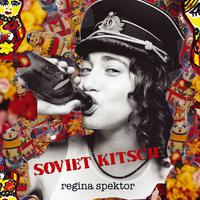
Soviet Kitsch
出生于莫斯科但成长纽约布朗克斯的Ragina Spektor,自小生活在一个音乐家庭,曾学习钢琴至17岁。这张「Soviet Kitsch」是Ragina加入主流唱片的首张专辑,独特的嗓音搭配钢琴弹奏,让人印象深刻。经由纽约摇滚团The Storkes主唱引介,曾与他们一起tour并参与“Post Modern Girls & Old Fashion Men”一曲的录音。专辑中除了充满想像空间的”Us”外,还与伦敦摇滚团Kill Kenada合作庞克味十族的”Your Honor”及足以媲美Fiona Apple和Cat Power的”Carbon Monoxide”、”Somedays”等创作。 Regina Spektor is, without a doubt, the most talented representative of New York's antifolk scene, although\n\ calling her ... Regina Spektor is, without a doubt, the most talented representative of New York's antifolk scene, although calling her that is like calling the current outbreak of bird flu Asia's least deadly epidemic. I'm an unapologetic relativist when it comes to music, so Spektor's alliance with the repulsive likes of The Moldy Peaches does color my perception of her. Antifolk's modus operandi is to masquerade drooling insolence as outsider art, but the unholy progeny of Tiny Tim and Beat Happening have a pretty good thing going, because it's absolutely impossible to approach them with any objective criterion of quality. TRENDING NOW Pass The Aux | Elton John and Brandi Carlile Regina Spektor doesn't need that coat of post-modern protection. Her songs are clever and touching in any context, and her technical prowess is considerable: A girl from a good Russian-Jewish family (her father comes to her shows), she's put her inevitable piano lessons to good use. Spektor does, however, constantly employ a trick I consider dirty: She reaches her audience's ears and heartstrings through feigned naivete. The I'm-just-a-wee-lass stance is apparent throughout *Soviet Kitsch, as well as her live performances, where she's been known to pout and giggle and murmur and feed the crowd chocolates; what the Russians call * manernost' is her only liability, but it's badly holding her back. Take the best song on the record, "Ghost of Corporate Future"; this exquisitely structured number steadily spirals up from a plinky opening to a majestic finish, from a street sketch to a Big Statement on life and how to live it. "Everything is plastic/ And everyone's sarcastic/ And all your food is frozen/ And it needs to be defrosted," sings Spektor in an inimitable mix of horror and wonderment. But watch the whimsy go to work: "Maybe you should cut your own hair/ 'Cause that would be so funny/ It doesn't cost any money/ And it always grows back." Spektor delivers "funny" in a kindergarten squeak that would only be accessible to the rest of us through regression therapy; this kind of stuff only works live, and then in measures. In the studio, it's murder: Even if Regina's mannerisms are totally spontaneous, guess what? They won't be by your third listen. Other songs suffer a similar fate. There's a wealth of great material here-- "Carbon Monoxide", the expansive "Chemo Limo", "Your Honor" with its sudden outbursts of punk thrash-- all diminished, to various degrees, by genre affectations. When Regina's not belting Billie, she's cooing Tori, or vamping up elastic Bronx vowels; although there's no Russian accent to speak of, Spektor's occasional Björk-isms compound the cuteness. Soviet Kitsch, which was deliberately intended as a minor release, is currently enjoying a wider audience than it appears to have been made for. Some of it has to do with Julian Casablancas' dabbling in arts patronage: Spektor opened for The Strokes on their European tour dates and duets on the inconsequential "Reptilia" B-side "Modern Girls and Old-Fashioned Men". I'm reminded of the way David Bowie parades around his admiration for Daniel Johnston: Spektor is becoming a unit of freak-cred currency. Except in this case, the ball is still in her court; she can still walk out of the corner into which the circumstance and alliances are painting her, with wits and talent intact.
